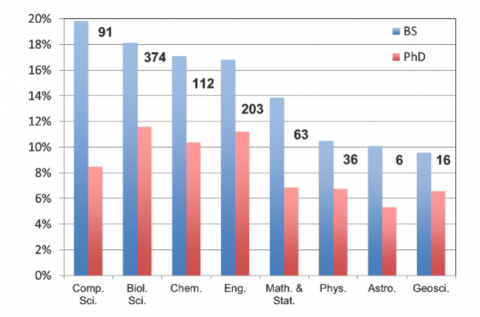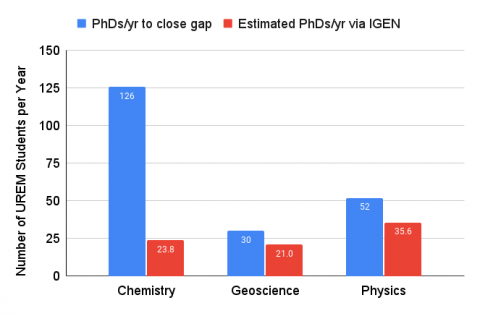What is IGEN?
Last updated: May 2, 2025
The NSF INCLUDES Alliance: Inclusive Graduate Education Network (IGEN) is a partnership of over 30 societies, institutions, organizations, corporations, and national laboratories poised to lead a paradigm shift in broadening participation for students who enter graduate or doctorate level programs in the physical sciences. As an Alliance, we work to reduce barriers to access and improve the quality of students’ mentoring and experiences. Through these efforts, we seek to increase overall participation in graduate physics programs and improving the knowledge base for the workforce of the future.

Percentage of students from groups with lower representation in the physical sciences. Numbers in black indicate the number of additional PhDs required to close the gap between BS and PhD degree attainment. Source: IPEDS, 2011-2015.
Participation in STEM
The participation gap widens between undergraduate and graduate studies in relation to underrepresented groups in STEM disciplines. Underlying drivers are many, but an ability to close the gap between undergraduate and graduate participation by students from under-represented groups in physics has been demonstrated through the American Physical Society's Bridge Program. The Inclusive Graduate Education Network Alliance proposes an innovative strategy to eliminate the gap in chemistry and geosciences within the five year timespan of this grant and to institutionalize inclusive, evidence-based practices for selecting and training a diverse, innovative, and globally competitive scientific workforce.
Our Partners
Physical Science Disciplinary societies are uniquely positioned to lead efforts that empower faculty members to reform and improve their graduate education practices. Scholars in graduate education and research mentorship are identifying effective practices and providing opportunities for professional development. Additional partners from societies, laboratories and industries form a constellation of organizations and individuals that can address systemic issues that inhibit students’ success in attaining doctoral degrees.
Our Plan
This project takes a full-spectrum, cross-sector approach to addressing institutional practices that hinder the success of students by:
- Improving the mentoring of researchers
- Transforming graduate admissions practices
- Recruiting large numbers of students who would otherwise not enter graduate studies
- Improving graduate retention measures
Our Commitment
IGEN is committed to achieving an audacious goal of increasing the number of under-represented students to the level where there is no difference in bachelor and doctoral degree attainment rates. The APS Bridge Program and the IGEN Launch Pilot’s systemic reforms are already on track to achieve this goal. By using a collective impact approach, the IGEN community will work together to realize similar results across all of the physical sciences.
Hear from our network:
"IGEN workshops have been great resource for myself and my colleagues."
Faculty Member
"I would say [the mentor training provided by CIMER] was very positive. It definitely presented perspective in where we may be, for example, misreading the cues coming from the people we are mentoring and so on, and of course, you basically internalize the way your thought process goes with handling people, and it definitely made me confront some of the assumptions I was making."
Staff Member at a National Laboratory
"Your advisor really dictates a lot of your experience as a graduate student... I definitely have just the best fit imaginable in terms of somebody whose research interests are really aligned with things that I have always been interested in, and then, also somebody who has a lot of cultural awareness and sensitivity to just what it means to be somebody who’s underrepresented in the geosciences."
Student in Bridge Program
Progress Toward Goals
The NSF INCLUDES Alliance: IGEN launched in September 2018 with four shared goals. In Year 5 of the project, IGEN partners have made progress towards those goals.
Goal 1. Increase the fraction of students from underrepresented groups who complete physical science doctoral degrees
- 75 students were accepted into IGEN-associated Bridge Programs in the 2023 recruiting cycle, bringing the total number of graduate students placed to 379
- Among students in the first 4 cohorts, IGEN-associated Bridge Programs had a retention rate of 94%
- IGEN is projected to help close the gap between bachelor’s degrees earned by UREM students and graduate degrees earned by UREM students by 19 percent for chemistry students, 78 percent for geoscience students, and 44 percent for physics students in graduate programs.

Goal 2. Catalyze the adoption of evidence-based inclusive practices in graduate education
- Since the inception of IGEN, the IP Hub engaged nearly 2,500 workshop participants to develop their capacity to implement inclusive practices in graduate education. In 2022/23, IGEN’s IP Hub delivered 25 workshops that were attended by 632 participants from more than 18 disciplines.
- 65% of faculty members indicated that their department’s admissions practices have changed due to their involvement with an ACS/AGU/APS Bridge Program.
- 95% of participating faculty members indicated their departments are using holistic practices in their admissions processes for the Bridge Program.
- MRS held a Research Scholars Summit that engaged over 130 attendees, including students and faculty who participated in professional development sessions, technical symposia, networking events, and presentations of research posters.
Goal 3. Conduct research that distills scalable, effective practices in inclusive graduate education & institutional change
- The IGEN Research Hub is currently conducting 13 discrete research studies. Members of the Research Hub are now in a phase of finishing and disseminating the research described in the original NSF INCLUDES Alliance proposal.
- IGEN leaders collaborated on and submitted a manuscript about the processes of culture change that IGEN has been pursuing.
- In 2022/23, the Research Hub produced seven research translation documents, including a guide to graduate student debt relief and a brief on task and relationship conflict.
- A Research Hub leader delivered a webinar titled "Creating Equitable and Inclusive Graduate Programs: From Recruitment to Admission to Retention" hosted by the National Institutes of Mental Health about the implications of the recent SCOTUS decisions for inclusive, equitable graduate programs.
Goal 4. Establish sustained, cross-sector partnerships that support the advancement of underrepresented students
- IGEN developed partnerships with 15 national laboratories, and CIMER continued to support leaders within the labs to help improve the quality of mentoring that postdoctoral scholars receive.
- CIMER delivered mentoring training titled “Facilitating Entering Mentoring” (train-the-trainer sessions) to 24 representatives of national laboratories and 8 faculty members from Bridge Program institutions.
- A CIMER representative delivered a keynote address titled “The Science of Mentorship in STEMM: Evidence-Based Practices for Mentors & Trainees” to 300 attendees as part an event series by Oak Ridge Institute for Science and Education.
